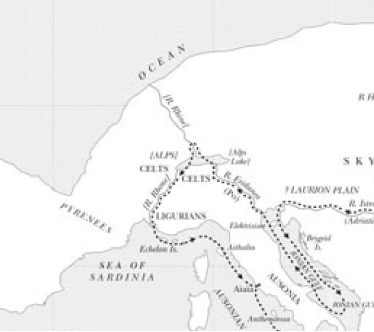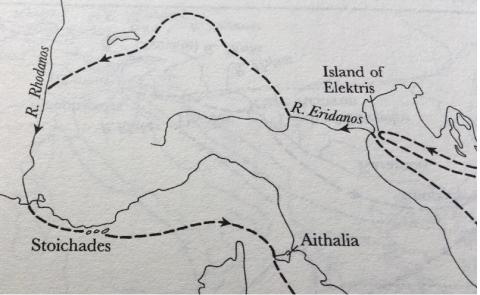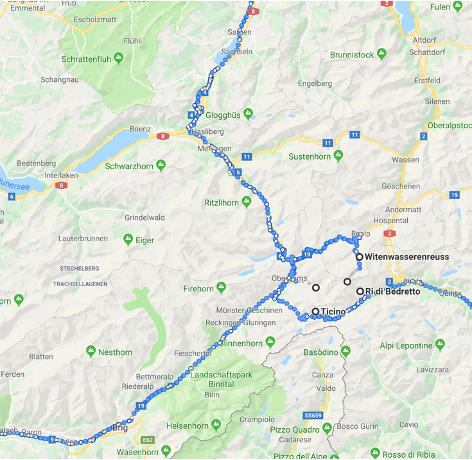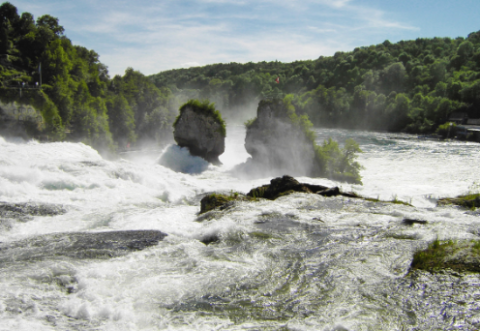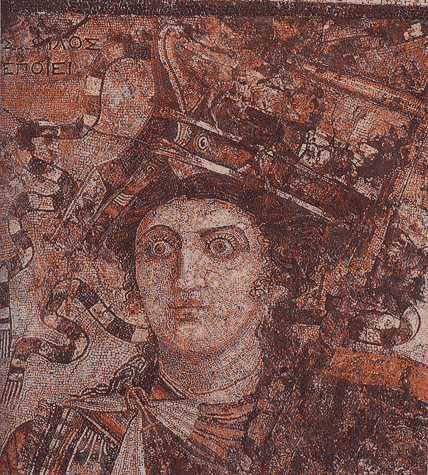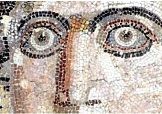ἐκ δὲ τόθεν Ῥοδανοῖο βαθὺν ῥόον εἰσαπέβησαν,
ὅς τ᾽ εἰς Ἠριδανὸν μετανίσσεται: ἄμμιγα δ᾽ ὕδωρ
ἐν ξυνοχῇ βέβρυκε κυκώμενον. αὐτὰρ ὁ γαίης
ἐκ μυχάτης, ἵνα τ᾽ εἰσὶ πύλαι καὶ ἐδέθλια Νυκτός,630
ἔνθεν ἀπορνύμενος τῇ μέν τ᾽ ἐπερεύγεται ἀκτὰς
Ὠκεανοῦ, τῇ δ᾽ αὖτε μετ᾽ Ἰονίην ἅλα βάλλει,
τῇ δ᾽ ἐπὶ Σαρδόνιον πέλαγος καὶ ἀπείρονα κόλπον
ἑπτὰ διὰ στομάτων ἱεὶς ῥόον. ἐκ δ᾽ ἄρα τοῖο
λίμνας εἰσέλασαν δυσχείμονας, αἵ τ᾽ ἀνὰ Κελτῶν635
ἤπειρον πέπτανται ἀθέσφατον: ἔνθα κεν οἵγε
ἄτῃ ἀεικελίῃ πέλασαν. φέρε γάρ τις ἀπορρὼξ
κόλπον ἐς Ὠκεανοῖο, τὸν οὐ προδαέντες ἔμελλον
εἰσβαλέειν, τόθεν οὔ κεν ὑπότροποι ἐξεσάωθεν.
ἀλλ᾽ Ἥρη σκοπέλοιο καθ᾽ Ἑρκυνίου ἰάχησεν640
οὐρανόθεν προθοροῦσα: φόβῳ δ᾽ ἐτίναχθεν ἀυτῆς
πάντες ὁμῶς: δεινὸν γὰρ ἐπὶ μέγας ἔβραχεν αἰθήρ.
ἂψ δὲ παλιντροπόωντο θεᾶς ὕπο, καί ῥ᾽ ἐνόησαν
τὴν οἶμον, τῇπέρ τε καὶ ἔπλετο νόστος ἰοῦσιν.
δηναιοὶ δ᾽ ἀκτὰς ἁλιμυρέας εἰσαφίκοντο645
Ἥρης ἐννεσίῃσι, δι᾽ ἔθνεα μυρία Κελτῶν
καὶ Λιγύων περόωντες ἀδήιοι. ἀμφὶ γὰρ αἰνὴν
ἠέρα χεῦε θεὰ πάντ᾽ ἤματα νισσομένοισιν.
μεσσότατον δ᾽ ἄρα τοίγε διὰ στόμα νηὶ βαλόντες
Στοιχάδας εἰσαπέβαν νήσους σόοι εἵνεκα κούρων650
Ζηνός: ὃ δὴ βωμοί τε καὶ ἱερὰ τοῖσι τέτυκται
ἔμπεδον: οὐδ᾽ οἶον κείνης ἐπίκουροι ἕποντο
ναυτιλίης: Ζεὺς δέ σφι καὶ ὀψιγόνων πόρε νῆας.
Στοιχάδας αὖτε λιπόντες ἐς Αἰθαλίην ἐπέρησαν
νῆσον, ἵνα ψηφῖσιν ἀπωμόρξαντο καμόντες655
ἱδρῶ ἅλις: χροιῇ δὲ κατ᾽ αἰγιαλοῖο κέχυνται
εἴκελαι: ἐν δὲ σόλοι καὶ τρύχεα θέσκελα κείνων:
ἐν δὲ λιμὴν Ἀργῷος ἐπωνυμίην πεφάτισται.
καρπαλίμως δ᾽ ἐνθένδε διὲξ ἁλὸς οἶδμα νέοντο
Αὐσονίης ἀκτὰς Τυρσηνίδας εἰσορόωντες:660
ἷξον δ᾽ Αἰαίης λιμένα κλυτόν: ἐκ δ᾽ ἄρα νηὸς
πείσματ᾽ ἐπ᾽ ἠιόνων σχεδόθεν βάλον. ἔνθα δὲ Κίρκην
εὗρον ἁλὸς νοτίδεσσι κάρη ἐπιφαιδρύνουσαν:
τοῖον γὰρ νυχίοισιν ὀνείρασιν ἐπτοίητο.
αἵματί οἱ θάλαμοί τε καὶ ἕρκεα πάντα δόμοιο665
μύρεσθαι δόκεον: φλὸξ δ᾽ ἀθρόα φάρμακ᾽ ἔδαπτεν,
οἷσι πάρος ξείνους θέλγ᾽ ἀνέρας, ὅστις ἵκοιτο:
τὴν δ᾽ αὐτὴ φονίῳ σβέσεν αἵματι πορφύρουσαν,
χερσὶν ἀφυσσαμένη: λῆξεν δ᾽ ὀλοοῖο φόβοιο.
τῶ καὶ ἐπιπλομένης ἠοῦς νοτίδεσσι θαλάσσης670
ἐγρομένη πλοκάμους τε καὶ εἵματα φαιδρύνεσκεν.
θῆρες δ᾽ οὐ θήρεσσιν ἐοικότες ὠμηστῇσιν,
οὐδὲ μὲν οὐδ᾽ ἄνδρεσσιν ὁμὸν δέμας, ἄλλο δ᾽ ἀπ᾽ ἄλλων
συμμιγέες μελέων, κίον ἀθρόοι, ἠύτε μῆλα
ἐκ σταθμῶν ἅλις εἶσιν ὀπηδεύοντα νομῆι.675
τοίους καὶ προτέρης ἐξ ἰλύος ἐβλάστησε
χθὼν αὐτὴ μικτοῖσιν ἀρηρεμένους μελέεσσιν,
οὔπω διψαλέῳ μάλ᾽ ὑπ᾽ ἠέρι πιληθεῖσα,
οὐδέ πω ἀζαλέοιο βολαῖς τόσον ἠελίοιο
ἰκμάδας αἰνυμένη: τὰ δ᾽ ἐπὶ στίχας ἤγαγεν αἰὼν680
συγκρίνας: τὼς οἵγε φυὴν ἀίδηλοι ἕποντο.
ἥρωας δ᾽ ἕλε θάμβος ἀπείριτον: αἶψα δ᾽ ἕκαστος
Κίρκης εἴς τε φυήν, εἴς τ᾽ ὄμματα παπταίνοντες
ῥεῖα κασιγνήτην φάσαν ἔμμεναι Αἰήταο.
notes
Travels across Middle Europe
The Argonauts continue their journey home, adopting a bizarre route, whose geography, while ultimately fictional, nevertheless makes sense on its own terms.
627–29 ἐκ τόθεν: “from there.” The phrase covers, without comment, what must be a significant distance. The Argonauts are imagined as crossing (εἰσεπέρησαν) from the Po (Eridanus) into the Rhodanus (Rhone); see further (Green 1997, 303), (Pearson 1938, 458). On the way, they are prevented from getting lost in the far north and possibly straying into “Ocean” by the intervention of Hera. A. is often accused of inaccuracy with regard to geography. However, the route that he maps out for the Argonauts has more than a degree of plausibility about it. See Media Section for two possible reconstructions taken, with thanks, from respectively (Green 1997) and (Thalmann 2011). To some extent, it is also possible to trace this route using modern maps: The Witenwasserenstock (see Media (“Witenwasserenstock” 2017)) is a peak between the Swiss cantons of Valais and Uri, located in the Lepontine Alps. Close to the summit lies the tripoint border between the cantons of Valais, Uri and Ticino and the triple watershed of the Rhine, Po and Rhône basins . . . (Read More). The mighty goddess Hera could have been perched on the Witenwasserenstock, itself a mighty peak (3,082 m), when she descended (line 640) to warn the Argonauts about venturing further North and the river systems that seems to pass close to it make it feasible for the Argonauts to find their way across Middle Europe.
629 βέβρυχε κυκώμενον: “(the water) seethes as it roars.” This imagined confluence (ξυνοχῇ) of the Rhine, Po and Rhône might have resembled this scene from the Rhine and similar; see further (Green 1997, ad loc.). The language here and below (631 ἐπερεύγεται ἀκτὰς) resembles Il. 17.263–5, a famous and much discussed simile in antiquity (see 129–30n.). αὐτὰρ ὁ: “now that river . . .”, i.e. the Rhône.
629–30 γαίης / ἐκ μυχάτης: “from the deepest recess of the earth.” This could easily equate with the “tripartite water-shed”, mentioned above. πύλαι καὶ ἐδέθλια Νυκτός: “the gates and foundations (halls). The phrase is a direct allusion to the poetry (“Poem of Parmenides : On Nature” 2006) of Parmenides, the pre-Socratic philosopher. Parmenides mentions these gates in the introduction to his poem, where he describes his journey to the House of Night to meet the goddess who is the guide for the remainder of his philosophical journey. There are obvious parallels between this journey and that of the Argonauts and Phaethon; Parmenides presents his philosophical journey as a more successful version of Phaethon’s: while Phaethon fails to control the chariot of Helios, Parmenides makes it through the gates of Night in a chariot with a burning axle (lines 6–7 ἄξων … αἰθόμενος). Similarly, the Argonauts are more successful travellers than Phaethon since they make it past the point where Phaethon fell (the noxious-smelling swamp); see further (Marshall 2017, 152–57).
631 ἔνθεν ἀπορνύμενος: “rising from there." A. describes the three-river system: τῇ μέν: “on one side.”
631–2 ἐπερεύγεται ἀκτὰς / Ὠκεανοῦ: “bursts forth upon the shore of Ocean.” Thus (Fränkel 1968, 507–9) is surely right to see, in A.'s linking of three rivers, with this branch discharging into Ocean (4.631, 637–38) the earliest classical reference to the Rhine. τῇ δ᾿: “On the other side.” This is the branch that empties into the Adriatic (μετ᾿ Ἰονίην ἅλα), the route along which the Argonauts have travelled. On the splitting off of river branches, see 285–7n.
633 τῇ δ᾿: “On the other side again.” Σαρδόνιον πέλαγος: “Sardonian Sea” was the name given by the ancients to the part of the Mediterranean sea adjoining the island of Sardinia on the West and South. ἀπείρονα κόλπον: “vast gulf.” A deliberately vague reference, perhaps to the great expanse of the Mediterranean or the Golfe du Lion. Together with ἤπειρον . . . ἀθέσφατον (below), it stresses the extent of the space that the Argonauts are covering.
634 ἑπτὰ διὰ στομάτων: “There is much difference in the statements about the number of the mouths of the Rhone. Timaeus, quoted by Strabo (p. 183), says that there were five outlets, for which Polybius reproves Timaeus, and says there were only two. Polybius (3.41)names the eastern branch the Massaliotic. Artemidorus, as cited by Strabo, made five mouths. Strabo does not state how many he supposed that there were,” Read more (“Dictionary of Greek and Roman Geography, RHO´DANUS” 1854). ἱείς: (transmitted text) pres. part. act. < ἵημι: “sending forth.” Understand βάλλει. The phrase is a variation on Il. 12.25 ἵει ῥόον, which may be a correction in the oldest Medieval manuscript, though the evidence is slight (Laurentianus, gr. 32.09); see further (Giangrande 1967, 87) and also (West 1963, 12). ἐκ δ᾿ ἄρα τοῖο: “from tha t river.”
635 λίμνας . . . δυσχείμονας: “stormy lakes.” εἰσέλασαν: “they rowed into.” ἀθέσφατον: “indescribably,” possibly an indication of the vagueness of A.’s geographical knowledge at this point of the Argonauts’ journey but also perhaps stressing the immense nature of their homeward voyage.
636–7 ἔνθα κεν οἵ γε: “there they would have . . .”, introducing a harsh contrafactual. ἄτῃ ἀεικελίῃ πέλασαν: “. . . encountered an inglorious fate,” in that they might have swept off into the unknown regions of Northern Europe, without divine intervention.
637 φέρε γάρ τις ἀπορρὼξ: “for a branch (of the river) ran into”: one of the three (see above).
638 κόλπον ἐς Ὠκεανοῖο: “into the gulf of Ocean.” οὐ προδαέντες: “not knowing before.” The Argonauts (and their author) are truly in unknown territory, though some of A.’s knowledge might be derived from geographers such as Timaeus (see above.)
639 ἐξεσάωθεν: 3rd plur. aor. pass. < ἐκσαόω / ἐκσῴζω.
640: Hera is Jason’s presiding goddess and so comes to the rescue. σκοπέλοιο καθ᾿ Ἑρκυνίου: “down from the Herkynian crag,” usually imagined to be to the North, perhaps in modern Germany. See note, however, on the Witenwasserenstock (above). ἰάχησεν: Hera’s scream echoes that of the Argο itself at 581.
641 οὐρανόθεν προθοροῦσα: “leaping forth from heaven." προθοροῦσα: aor. part. < προθρώσκω. Hera’s intervention is very sudden: no Olympian preplanning. ἐτίναχθεν: “aor. pass. 3rd. plur. < τινάσσω. “were shaken.” φόβῳ . . . ἀϋτῆς: “by fear of her cry.”
642 ἐπὶ . . . ἔβραχεν: in tmesis: “crashed.” μέγας . . . αἰθήρ: “the great vault of heaven.” The lightning splits the sky as Hera appears on top on the (Alpine?) Crags: a terrifying image.
643 παλιντροπόωντο: “they were turned back.” The verb may be unique to A. (see LSJ) but its formation follows Homeric precedent (see 163–6n.). θεᾶς ὕπο: “by the goddess.”
644 τὴν οἶμον: “that route.” τῇ πέρ τε καὶ: “by which.” The combination of particles is difficult to convey in translation. They perhaps emphasise the closure of this dangerous moment. ἔπλετο νόστος ἰοῦσιν: “there was a return for them on their journey (ἰοῦσιν).” The Argonauts are to enter the Rhone (see above).
645–7 ἔθνεα μυρία Κελτῶν: Switzerland (?) and Liguria are shrouded in mystery and Hera’s mist. Maybe it is lack of local knowledge on A.’s part but he is emphasising the vastness of the voyage and wants them quickly back into the Mediterranean, where more possibilities for stories from the Argonautic tradition lie. However, this casting of his heroes into lands free from Myths will happen again when they land in the Syrtes (Libya) and A. will be free to develop his own Alexandrian tradition for the Argonauts. ἁλιμυρέας: “sea-washed.” They emerge from the river complex.
646 Ἥρης ἐννεσίῃσι: “by the designs of Hera.” The Queen of the Gods is still directing operations.
647 περόωντες ἀδήιοι: “crossing unharmed.” The Celts were notoriously fierce-they presented problems for Hannibal, when he tried to pass through the Alps. Hera’s mist, therefore, is essential to the Heroes’ safety, modelled as it is on that which Athena pours round Odysseus when he approaches Alcinoos’ palace (Od. 7.14–15) and copied by Virgil when he describes Aeneas’ approach, similarly protected by Venus, to Dido’s city (Aen. 1.411).
647–8 αἰνὴν / ἠέρα χεῦε θεὰ: “the goddess spread about them a strange uncanny mist.” πάντ᾿ ἤματα νισσομένοισιν: "every day of their journey”. ἠέρα: < ἀήρ and often linked with Ἥρη, though that derivation is not pressed here.
649 μεσσότατον δ᾿ ἄρα τοί γε διὰ στόμα: “through the central mouth (of the river Rhone). διὰ . . . νηὶ βαλόντες: “passing with the ship” (tmesis for διαβάλλω LSJ Ι2).
650 Στοιχάδας . . . νήσους: the Stoichades islands (also mentioned in 554–5n.). Near Liguria, perhaps the Îles d'Hyères, the name means “islands in a row.” σόοι: “safe,” i.e. the Argonauts because of the actions of the Dioskouroi (650–1 κούρων / Ζηνός, “the sons of Zeus) in 593, who raised their hands in prayer to the immortals and were, thus, instrumental in gaining Hera’s aid.
651 ὃ δὴ: “for that reason, indeed.” βωμοί τε καὶ ἱερὰ: “altars and holy rites.” τέτυκται: “were established”: perf. ind. 3rd. sg. < τεύχω. The sing. is used because of the neut. pl. ἱερά.
652 ἔμπεδον: is used to mark the continuity of the cult in honour of the Dioskouroi. οὐδ᾿ οἶον: “nor only.” κείνης . . . ναυτιλίης: “of that voyage,” i.e. the Argonauts’ return. ἐπίουροι ἕποντο: “did they follow as guardians.”
653 Ζεὺς . . . πόρε νῆας: Zeus creates a cult by assigning the Dioskouroi a particular sphere of action.
654: A. continues to write in his fast-flowing, simple, narrative style which he adopts when the Argonauts are travelling. Αἰθαλίην / νῆσον: Elba, off the Tuscan coast. The name could refer to iron deposits in the soil (see the aetion that follows), deriving the name from αἰθαλόεις, “burnt-coloured.”
655–6: Something notable happened on the island: the Argonauts stopped for some athletic relaxation from the great stretches of rowing that they have done. ἵνα ψηφῖσιν ἀπωμόρξαντο . . . / ἱδρῶ ἅλις: “they wiped off an abundance of sweat, with small pebbles.” καμόντες: “after their exertions” refers to the games, not to the rowing that has gone before.
656–7 χροιῇ δὲ . . . εἴκελαι: “Like the colour of skin.” The pebbles on the beach are a peculiar shade and the islanders relate this to the passing of the Argonauts; see further Strabo 5.2.6. κατ᾿ αἰγιαλοῖο κέχυνται: recalls Od. 22.387 ἐπὶ ψαμάθοισι κέχυνται, where the dead suitors are macabrely likened to fish caught and laid out on the seashore. A. has picked up an interesting geographical titbit from his source and mentions it in typically allusive fashion. He concludes with a particularly interesting detail: ἐν δέ: “and among them.” The phrase is used adverbially; (LSJ C). σόλοι καὶ τρύχεα θέσκελα κείνων: “their quoits and the miraculous remains (rags, tatters) lie." κέχυνται is to be understood from the previous line. There is no reason why the islanders on Elba should not have claimed that the Argonauts accidently left behind a tunic or two, after they had competed in the games and that these were preserved after the manner of the relics of Medieval Saints. In addition, τρύχεα (rather than τεύχεα) is owed to the second hand of the Laurentianus (Plut.32.9), who often preserves good readings, and a rare word which A. might well have savoured.
658 λιμὴν Ἀργῷος: There was more than one harbour named after (ἐπωνυμίην) the Argo (see 1620). This one is apparently the modern Portoferraio. πεφάτισται: ind. mp. 3rd. sg. < φατίζω; a suitable word for aetiological discussions; see also Arg. 1.1019 Ἱερὴ δὲ φατίζεται, Call. h. 1.39 πεφάτισται.
659 ἐνθένδε: they leave Elba and go “through the swell of the sea (διὲξ ἁλὸς οἶδμα) of Ausonia.”
660 ἀκτὰς Τυρσηνίδας εἰσορόωντες: “watching the coast of Tyrrhenia go by.” The area is that between Rome and Naples, where Circe’s Western home (Aiaie) has been identified. A. knew that there were two conflicting traditions regarding Circe's habitat (both, significantly, known as Aia or Aiaia; cf. 313). Homer, as one might expect from Kirké's connection with Helios, located her in the east (probably around Kolchis): Od. 12.3–4. However, an almost equally ancient version (Hes. Th. 1011–16) placed her in the far west, on the Italian coast, at a point subsequently identified as Monte Circeo, midway between Rome and Naples.
661 ἷξον: “they arrived” < ἵκω: aor. ind. act. 3rd. pl. Αἰαίης λιμένα κλυτόν: “famous harbour of Aiaie,” “famous” principally because we, as readers, should remember Od. 10.135–6.
662 πείσματ᾿: “the stern cables.” The Argonauts waste no time in tying up in the harbour. σχεδόθεν: means “near at hand.” Speed is of the essence in this episode, unlike the leisurely Homeric counterpart, so they run the Argo right up the beach (ἐπ᾿ ἠιόνων) where Circe is sitting. Jason and Medea are in urgent need of absolution (587). Κίρκην: the name frames the episode (see 752); similarly with the murder of Apsyrtus (451 ~ 81).
663 εὗρον: “they found,” echo of the Homeric Circe (Od. 10.210). ἁλὸς νοτίδεσσι: lit. “with the moisture of the sea.” i.e. with seawater. ἐπιφαιδρύνουσαν: “making, clean.” The spondaic ending of the line emphasises the importance of the act. Such line endings are a feature of this episode (and Hellenistic poetry in general.)
664 τοῖον γὰρ: “for to such an extent.” νυχίοισιν ὀνείρασιν: “by nightly dreams,” perhaps sent by Hermes, who is associated with dreams and who warns Circe that she will be visited by Odysseus (Od. 10.330–2). ἐπτοίητο: “was terrified,” plup. ind. 3rd. sg. < πτοέω.
665 αἵματί: the emphatic first position in the line for this important word: “with blood.” It deepens the sinister tone. οἱ: is the dat. of possession, to be taken with δόμοιο: “her palace." θάλαμοί τε καὶ ἕρκεα: “the chambers and courtyards.”
666 μύρεσθαι δόκεον: “seemed to flow.” φλόξ: both blood and fire. The previous night has been a ghastly intrusion into Circe’s existence and a harbinger of the purification rite that she will be called upon to perform for Jason and Medea.
667 This line alludes to the role that she plays in the Odyssey-she turns his men into pigs-and knowingly disrupts the chronology of the story that A. is presently telling. Such narratorial tricks and allusions are typical of A.’s poem throughout. θέλγ(ε): “used to bewitch” is a verb frequently used of her niece Medea.
668 τὴν: i.e. the flame. φονίῳ . . . αἵματι: “blood of a killed victim.” Such descriptive details increase the sinister atmosphere of the scene as does the use of πορφύρουσαν (another spondaic ending) usually used of the surging sea, but here of the darkening flame of the fire. σβέσεν: is perhaps an echo of κατέσβεσε θεσπιδαὲς πῦρ (Il. 21.381): and most famously of all, in a metaphorical sense: ἔστιν θάλασσα, τίς δέ νιν κατασβέσει; "who shall dry it up?" (Aesch. Ag. 958).
669 χερσὶν ἀφυσσαμένη: “drawing it up with her hands.” ἀφύσσω is usually used of drawing liquids, esp. from a larger vessel with a smaller, νέκταρ ἀπὸ κρητῆρος ἀφύσσων (Il.1.598). A. gives a grotesque twist to the more usual Homeric usage. λῆξεν δ᾿ ὀλοοῖο φόβοιο: “she ceased from deadly fear:” genitive of separation.
670–1 contain verbal echoes of 663–4, bringing the opening of this episode to a close: τῶ καί: “and so.” ἐπιπλομένης ἠοῦς: to be translated with ἐγρομένη: “waking with the coming dawn.” πλοκάμους τε καὶ εἵματα: “hair and clothes.” In Homer, Circe is ἐϋπλόκαμος (Od. 10.36.) φαιδρύνεσκεν: “was washing;” the simple verb (with the same meaning) rather than the compound used earlier (663 ἐπιφαιδρύνουσαν).
672 θῆρες δ: “but her beasts . . .” opening the next section of the episode with an allusion to the Homeric story which is immediately subverted. C. turns Odysseus’ men into beasts (pigs) and her woods are full of bewitched animals. What follows is completely different.
673 οὐδὲ μὲν οὐδ(ε): “nor yet.” The doubled conjunction stresses the statement. ἄνδρεσσιν ὁμὸν δέμας: lit., (understanding ἐοικότες from the previous line) “(like) men with respect to a common body.” ὁμὸν rather than ὅλον (“in their body as a whole” Hunter, ad loc. finding a reference to Empedocles). The phrase seems to be based on Od. 8.14 δέμας ἀθανάτοισιν ὁμοῖος (also Il. 8.305 δέμας ἐϊκυῖα θεῇσιν). The allusion is to Empedocles’ pre-Socratic theory of evolution: first come animals composed of “separate limbs not joined together”, followed by forms made from disparate limbs and eventually whole-natured forms.
673–4 ἄλλο δ᾿ ἀπ᾿ἄλλων συμμιγέες μελέων: contrasting with ὁμὸν δέμας, lit. “mixed up, in a different way (ἄλλο is adverbial) from different limbs:” a very compressed description of the Empedoclean theory. κίον ἀθρόοι: finally, the main clause of the sentence: “they came along in droves.” The simile of the flock, which follows, also naturally suggests itself.
675 ἐκ σταθμῶν: “from their stalls. ἅλις: “in crowds, in droves.” εἶσιν: “they go”: pres. ind. act. 3rd. sg. < εἶμι: the subject is μῆλα (neut. plur.). ὀπηδεύοντα νομῆι: agreeing with μῆλα: “following their shepherd.”
676: Now follows the notion of mud, slime, or clay as primal matter (see Green ad loc.): τοίους καὶ προτέρους: “Similar (creatures) in earlier times.” ἐξ ἰλύος: “from the primeval ooze.” ἐβλάστησεν: “brought forth.”
677 μικτοῖσιν ἀρηρεμένους μελέεσσιν: “fitted with mixed limbs,” a variation on 673–4. ἀρηρεμένους: pf. pass. part. < ἀραρίσκω.
678 διψαλέῳ μάλ᾿ ὑπ᾿ ἠέρι: “by the parched air.” πιληθεῖσα: “condensed made solid:” aor. pass. part. < πιλέω, agreeing with χθὼν αὐτή.
679–80 οὐδέ πω: “Nor yet.” ἀζαλέοιο βολαῖς . . . ἠελίοιο: “by the parching rays of the sun.” τόσον: “so great = sufficient.”
680 ἰκμάδας αἰνυμένη: “achieving / receiving drops of moisture.” The participle is parallel with πιληθεῖσα and refers to the theory that oceans were formed either after moisture evaporated from the primeval slime and then fell again as rain or resulted from the moisture sweated out of the slime by the action of the sun. τὰ δ᾿: “these things,” referring in general terms to “the first creatures.” ἐπὶ στίχας: “into ranks, species.” ἤγαγεν αἰών: “time marshalled them.”
681 συγκρίνας: “having arranged:” a scientific term denoting ordered rearrangement of parts. τώς: “thus, just so,” picking up 674–5. A. often closes a section with a reference back to its beginning. φυὴν ἀίδηλοι: “unclear in their form.” ἕποντο: “followed” picks up ὀπηδεύοντα.
682 ἥρωας δ᾿ ἕλε θάμβος ἀπείριτον: “And exceeding wonder seized the heroes.” As well it is might, confronted by Sorceress washing her hair on the seashore, surrounded by her herd of partly-formed creatures.
682–3 ὄμματα: this is further explained at 727–9. The descendants of Helios, the Sun, are regularly credited with eyes of preternatural brilliance (4.145, 727–29, 1669–72). Contemporary parallels also suggest themselves, when one remembers the dominant character of Ptolemy Euergetes’ queen, Berenice II, who, apart from sharing Medea’s murderous traits, is also credited with the same piercing regal eyesight; see further Clayman (2014) 112–3 on Berenice portrayed with eyes radiating power that are larger than life (see Media Section for illustrations). φυήν: “physical appearance, stature.” The repeated use of the word is perhaps meant to draw attention to the striking and alluring figure of Circe compared with the indistinct nature of her followers. ἕκαστος . . . παπταίνοντες: A. uses ἕκαστος with both sing. and plur. verbs: 4.185, 4.1291–2, Smyth 951.
684 φάσαν ἔμμεναι: “asserted that she was.” ἔμμεναι: pres. inf. act. < εἰμί (I am).
Bibliography:
Claymann, D.L. 2014. Berenice II and the Golden Age of Ptolemaic Egypt. Oxford: OUP
“Dictionary of Greek and Roman Geography, RHODANUS.” 1854. http://www.perseus.tufts.edu/hopper/text?doc=Perseus:text:1999.04.0064:id=rhodanus-geo.
Fränkel, H. 1968. Noten zu den Argonautika des Apollonios. Munich.
Giangrande, G. 1967. “‘Arte Allusiva’ and Alexandrian Epic Poetry.” The Classical Quarterly 17 (1): 85–97.
Green, P. 1997. The Argonautika by Apollonios Rhodios Translated with Introduction, Commentary and Glossary. Berkeley.
Marshall, Laura Ann. 2017. “Uncharted Territory: Receptions of Philosophy in Apollonius Rhodius’ Argonautica.” The Ohio State University. https://etd.ohiolink.edu/apexprod/rws_etd/send_file/send?accession=osu150330016014072&disposition=inline.
Pearson, Lionel. 1938. “Apollonius of Rhodes and the Old Geographers.” The American Journal of Philology 59 (4): 443. https://doi.org/10.2307/291181.
“Poem of Parmenides : On Nature.” 2006. 2006. http://philoctetes.free.fr/parmenidesunicode.htm.
Thalmann, W. 2011. Apollonius of Rhodes and the Spaces of Hellenism. Oxford:OUP.
West, M.L. 1963. “Critical Notes on Apollonius Rhodius.” CR 13: 9–12.
“Witenwasserenstock.” 2017. In Wikipedia. https://en.wikipedia.org/w/index.php?title=Witenwasserenstock&oldid=776314680.
vocabulary
ἐκ τόθεν, from there
Ῥοδανος, ὁ, river Rhodanus
βαθύς βαθεῖα βαθύ, deep, high
ῥόος, ὁ, a stream, flow, current
εἰσπεράω, to pass over into
Ἠριδανός, ὁ, river Eridanus
μετανίσσομαι, to flow into
ἄμμιγα, coming together, mixing
ξυνοχή, ἡ, a coming together
βρυχάομαι, to roar, bellow
κυκάω, to stir up, seethe
πύλη, -ης, ἡ, gate 630
ἐδέθλιον, τό, foundation, seat, hall
ἀπόρνυμι, to rise
ἐπερεύγομαι, to burst forth upon
ἀκτή, ἡ, headland, foreland, promontory
Ὠκεανός, ὁ, Oceanus
Ἰόνιος, Ionian (Name)
Σαρδόνιος, Sardonian (Νame)
πέλαγος, τό, the sea
ἀπείρων, boundless
κόλπος, -ου ὁ, gulf
ἵημι, ἥσω, ἧκα, εἷκα, εἷμαι, εἵθην, put in motion, send
λιμνή, ἡ, lake 635
εἰσελαύνω, to drive in
δυσχείμων, wintry, stormy
ἤπειρος, -ου, ἡ, the land (not the sea)
πετάννυμι, to spread out
ἀθέσφατος, over indescribable distances
ἀεικέλιος, woeful, inglorious
πελάζω, to meet with
ἀπορρώξ, branch
προδάω, to know beforehand
μέλλω, μελλήσω, ἐμέλλησα, --- --- ---, think of doing, intend to do, be destined
ὑπότροπος, returning
ἐκσῴζω, preserve from danger, keep safe
σκόπελος, ὁ, a look-out place, a peak, headland 640
Ἑρκυνίος, Herkynian (Name)
ἰαχέω, to cry, shout, shriek
οὐρανόθεν, from heaven, down from heaven
προθρώσκω, to spring forth
τινάσσω, to shake
ἀϋτή, ἡ, cry, shout
ὅμως, still, nevertheless
βράχω, clash, crack
αἰθήρ, ἡ, ether, the brighter purer air, the sky
παλιντροπάομαι, return
νοέω, νοοῦμαι, --- --- --- ---, perceive, observe
οἶμος, ὁ, a way, road, path
πέλω, to be
δηναιός, after a long while 645
ἁλιμυρής, washed by the sea
εἰσαφικνέομαι, to come into
ἐννεσίη, ἡ, a suggestion
ἔθνος, -ους τό, tribe, nation
μυρίος -α -ον, numberless, infinite
Λίγυς ὁ, a Ligurian
περάω περάσω (or περῶ) ἐπέρασα πεπέρακα --- ---, pass through
ἀδήιος, unassailed, unravaged
αἰνός -ή -όν, dread, grim, very thick
ἀήρ ἡ, the lower air, the air
χέω χέω ἔχεα κέχυκα κέχυμαι ἐχύθην, to pour
νίσσομαι, to go, go away
μεσσότατος -η -ον, middle, in the middle
Στοιχάδες αἱ, the Stoichades islands 650
εἰσαποβαίνω, pass out to.
σῶς, safe and sound, alive and well, in good case
βωμός -οῦ ὁ, altar
τεύχω τεύξω ἔτευξα τέτευχα τέτυγμαι ἐτύχθην, build
ἔμπεδον, for ever
οἶος -η -ον, alone
ἐπίουρος, a guardian, watcher
ναυτιλίη ἡ, voyage
ὀψίγονος, late-born, after-born
πόρω, entrust
Αἰθάλεια -ας, ἡ, Aithaleia (Name)
ψηφίς ἡ, a small pebble 655
ἀπομόργνυμι, to wipe off
κάμνω καμοῦμαι ἔκαμον κεκήμακα --- ---, work, labour
ἱδρώς, sweat
ἄλις, enough
χροιή ἡ, the skin
αἰγιαλός, the sea-shore, beach
εἴκελος, like
σόλος, a weight for throwing
τρῦχος, -εος τό, a rag, tattered garment (see notes)
θέσκελος, marvellous, wondrous
λιμήν -ένος ὁ, harbor
Ἀργῷος -η, -ον, Of the Argo
ἐπωνύμιος, called by the name of
φατίζω, to say, speak, report
καρπαλίμως swiftly
ἐνθένδε, from here
διέκ, through
Αὐσόνιος -α, -ον, Ausonian, Italian 660
ἀκτή, headland, foreland, promontory
Τυρσηνίς, Etruscan, Tyrrhenian
εἰσοράω, to look into, look upon, view, behold
Αἰαίη, Aeaea, island of Circe
λιμήν -ένος ὁ, harbor
κλῠτός, ή, όν , illustrious, glorious
πεῖσμα, a ship's cable
ἠιών, a sea-bank, shore, beach
σχεδόθεν, near at hand
νοτίς, moisture, wet
κάρα, the head
ἐπιφαιδρύνω, wash
νύχιος, in the night
ὄνειρος τό, a dream
πτοέω, to terrify, scare
αἷμα -ατος τό, blood 665
θάλαμος -ου ὁ, chamber
ἕρκος, a courtyard
μύρω, to flow, run, trickle
δοκέω δόξα ἔδοξα δέδογμαι -εδόχθην, seem, think, suppose
φλόξ, a flame
ἀθρόος -α -ον, crowded together, many
φάρμακον -ου τό, drug
δάπτω, to devour
πάρος, before, formerly
θέλγω, to bewitch
ἱκνέομαι ἵξομαι ἱκόμην --- ἷγμαι ---, come
φόνιος, of a killed victim
σβέννυμι, to quench, put out
πορφύρω, surge, gleam darkly
ἀφύσσω, to draw
λήγω, cease
ὀλοός, destructive, deadly
φόβος -ου ὁ, flight, panic, fear
ἐπιπέλομαι, to come to, arrive 670
ἠώς ἠοῦς ἡ, dawn, morning-red
ἐγείρω ἐγερῶ ἤγειρα ἐγρήγορα --- ἠγέρθην, rouse, stir up
πλόκαμος, a lock
εἷμα -ατος τό, garment
φαιδρύνω, to make bright, to cleanse
θήρ θηρός ὁ, wild animal
ἔοικα, ptc. εἰκώς, be like, look like, seem
ὠμηστής, wild, eating raw flesh
ὁμός -ή -όν, same, common, joint (see notes)
δέμας, the (physical frame, form of the) body
συμμιγής, commingled, promiscuous
μέλος -εος τό, a limb
κίω, go,
ἀθρόος -α -ον, crowded together, many
ἠύτε, as, like as
μῆλον -ου τό, sheep or goat
σταθμός, stall 675
ὀπηδέω, follow, accompany, attend
νομεύς, a shepherd, herdsman; pl. ribs of a ship
τοῖος -α -ον, such
πρότερος -α -ον, before, earlier
ἰλύς, mud, slime, dirt
βλαστάω, bring forth
χθών χθονός ἡ, the earth, ground
μικτός, mixed, blended, compound
ἀραρίσκω, fit with
πω, up to this time, yet
διψαλέος, thirsty
μάλα, very, very much
ἀήρ, the lower air, the air
πιλέω, to compress
ἀζαλέος, dry, parched
βολή, a throw, the stroke
τόσος, so great, so vast
ἰκμάς, moisture, juice 680
αἴνυμαι, receive, gain, take hold of
στίξ, a row, line, rank, species
ἄγω ἄξω ἤγαγον ἦχα ἦγμαι ἤχθην, order
αἰών, life, lifetime, time; spinal marrow
συγκρίνω, to arrange
τώς, so, in this wise
φυή, form, growth, stature
ἀΐδηλος, ill-defined, unclear in their form
θάμβος, astonishment, amazement
ἀπείριτος, boundless, immense
ἕκαστος -η -ον, each, every one
παπταίνω, to look earnestly, gaze
ῥεῖα, easily, lightly

